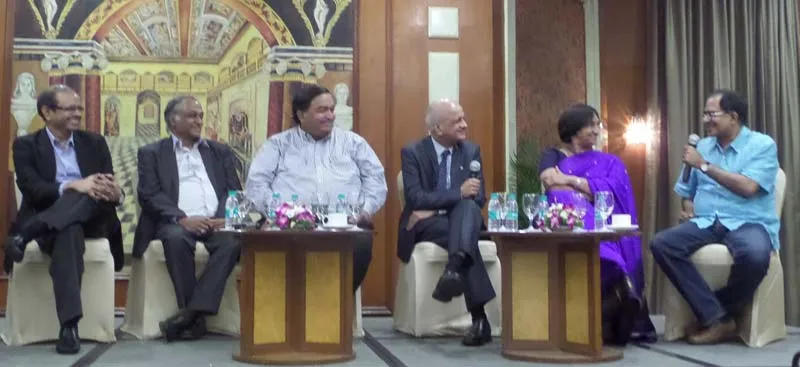Experts: There will be no separate category called startups – all companies will be like startups
Startups will become the norm. The pace of innovation has become so fast that all companies will have to become agile and emulate startups. Eventually, all companies will become startups, according to an expert panel of industry leaders.
Here are my eight takeaways from the panel convened during the launch of the book ‘From Startups to Global Success,’ by Ganesh Natarajan, CEO, and Prameela Kalive, Executive Vice President, Strategic Services and Location Head (Pune), Zensar Technologies. The panel included Ravi Gururaj, serial entrepreneur and Founder of Frictionless Ventures; R. Chandrashekhar, President, NASSCOM; Sharad Sharma, Co-founder, iSPIRT; and Prof. S. Raghunath, IIM Bangalore.

Startups: the ‘new normal’
As the pace of innovation goes through the roof, large companies will have to re-mould themselves as startups. Global software leaders such as Intuit are already re-casting themselves as lean startups powered by design thinking (see my writeup on Design for Delight), and Indian IT pioneers such as Infosys are also flattening and re-structuring to think and act like startups.
While this may be a tough transformation, there are other options also available, such as alliances, investments, accelerators or outright acquisition. For example, Zensar acquired the e-commerce solutions firm Professional Access, and Infosys invested in Waterline Data Science (see my framework of 15 innovation tips: how large corporations can successfully engage with startups).
The tech edge
We are living in an era where technologies are the key building blocks of innovation, and these building blocks are available more easily than ever before. This is helping tech-empowered outsiders to disrupt the transportation and health industries in ways that incumbents could not see or respond to, as shown by companies like Uber. Technology has created exponential change in sectors like telecommunications, though other sectors may have a more linear traditional growth trajectory.
Technology will play a disruptive role as disintermediator, which will be particularly acute in countries like India where intermediaries have played a major controlling and even stifling role. Jobs and roles which can be automated will be disrupted as well. Artificial minds and connected minds will transform the nature of work, thanks to artificial intelligence and IoT which will transform the way services are monitored and delivered (see my review of the book Code Halos). We may even see an era where assembly-line robots go on strike because their work has been taken over by 3D printers!
Bimodal mindset
Companies will need to effectively balance two mindsets – creative entrepreneur and productive performer. ‘Faster and cheaper’ will have to co-exist with ‘take risks and fail fast;’ ‘define’ a new process will have to be balanced with ‘refine’ that process. Maintaining such a dual culture in a much more rapid cycle of execution will be a challenge for leaders. (Author Jatin Desai compared innovation to the front wheel and handle bar of a bicycle, and performance to the rear wheel; see my review of his book ‘Innovation Engine’).
Even the most innovative companies have to master regular routine activities such as supply chain management. Even the mighty Apple does not design and roll out new phones every single month. Relentless innovation has to be balanced with process efficiency and employee productivity; next practices and best practices must co-exist and follow each other.
Transformation of the Indian IT sector
The ‘Golden Era’ of the Indian IT services sector is over – but the sector is far from finished. One ‘S-curve’ of a market cycle has run its course and a new ‘S-curve’ is beginning, powered by digital ecosystems like SMAC and digital innovation via startups. The transition period between such ‘S-curves’ is difficult but not insurmountable.
While the Indian IT and BPO services sectors have been written off by experts a number of times, these companies are resilient and reinventing themselves for the digital age, eg. via external and internal social media, more open communication styles and creative cultures.
Gen Net, Gen Next
The current generation of youth in India does not seem to be constrained like previous generations in terms of accepting and obeying hierarchies or herds of the past. They are willing to work on goals and challenges, and not just for money.
They are plugged in, learn fast, and bounce back, and will choose a career track which gives them learning, has positive impacts, provides mentors, and opens up networks. Established professionals too need to adopt such attitudes, and plan for three-year phases rather than 30-year tracks. A malleable mindset is the key, with a willingness to pivot.
Leadership and vision
Leaders will increasingly need to sharpen their ability to see round the corner; they need to be more collaborative and less insular. They need to design new pathways of information flow, decision making and collaboration in the company, eg. consensus based on an e-Bay kind of open marketplace for projects, managers and employees.
Zensar has dispensed with the traditional bell-curve for talent assessment; it even got rid of the tie as dress code, to allow for more informal and non-hierarchical social networks. It has built its success through ‘vision communities’ and ‘love culture.’

A culture of experimentation should be promoted, particularly since the cost of experimentation for small teams of innovators has dramatically dropped. This may lead to a blend of product and service offerings in the same company.
Valuation: collapse or correction?
‘Casino investors’ and media hype are creating a distorted perception of entrepreneurship. Comparisons between India and China, which pitch India as the next China, are flawed for a number of reasons, such as the fact that many foreign players are not allowed to operate in China.
There may be a correction as some unicorns collapse or combine, but the tough times will be good for true entrepreneurs who have the sense of discipline and perspective; these are the ones who do not just see startups as ‘cool.’ In that sense, VCs should be seen as catalysts and not major drivers of the startup ecosystem in India.
Government roles
While much attention in India has focused on digital startups, the government and industry need to target neglected areas like agriculture and energy, and collaborate to chart the unfathomable waters ahead. The risk of the digital divide getting amplified should be tackled so as to create a more level playing field.
Launching Make in India and Startup India are good beginnings, but the real action is in all the details. The Indian government plays a key role in creating a better ecosystem for startups, from policy to infrastructure. While even the sky is not the limit for startups, the roads seem to be the limit today in most cities!
Feature image: shutterstock







![[100 Emerging Women Leaders] How Gayatri Agrawal is inspiring women to embrace tech](https://images.yourstory.com/cs/2/f9bdfa20c75811ed9569e5d19beae38b/100EWLGayatri-AgrawalFeatureImage-1732290015187.jpg?mode=crop&crop=faces&ar=1%3A1&format=auto&w=1920&q=75)